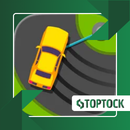Brain Test: Tricky Puzzles That Will Twist Your Mind

It seems your mind has a mind of its own, so let’s delve into the fascinating world of Brain Test. For many, it’s more than a simple game.
Anúncios
This puzzle phenomenon represents a shift in how people engage with digital entertainment, prioritizing cunning over a quick trigger finger.
The game’s success proves that a well-crafted mental challenge can captivate millions. This is not about brute force, but about a more subtle, cerebral kind of warfare.
The allure of these perplexing mobile titles lies in their unique premise. Players are thrown into a world where conventional logic is useless.
They must abandon their preconceived notions about how games should work. Every level demands a new perspective, a fresh way of looking at a problem.
Anúncios
The creators of Brain Test masterfully exploit our reliance on patterns, forcing us to think outside the box.
The Cognitive Revolution in Gaming
Mobile gaming has long been dominated by genres like action and simulation, but a quiet revolution has been happening.
The market for brain training apps and puzzle games is experiencing a significant surge.
According to InsightAce Analytic, the global brain training apps market was valued at $11.8 billion in 2024 and is projected to reach an astounding $115.8 billion by 2034.
This growth shows a clear public appetite for games that offer cognitive benefits.
People are not just looking for a way to kill time; they are seeking a way to sharpen their minds.
A common analogy for the game’s design is a lock and key. We’re taught to find the key that fits the lock.
The game, however, challenges that idea, suggesting the lock itself might be the key, or perhaps the key is not physical at all.
This intellectual subversion is what makes it so engaging. It’s like being a detective where the clues are intentionally misleading, and the truth is hidden in plain sight.
Why Deception Is the Ultimate Game Mechanic
This game is built on a foundation of misdirection. Simple instructions are often the most cunning lies. For example, a level might ask you to “help the hungry cat find its fish.”
Most players would search the screen for a fish, maybe in a pond or a bowl. The unexpected solution might be to drag the word “fish” from the text itself to the cat, feeding it instantly.
Read more: Block Blast Adventure Master: Clear the Grid with Smart Moves and Fast Thinking
This level design encourages players to manipulate every element, not just the obvious ones. The genius of Brain Test is found in this subtle and playful deception.
Another great example involves a riddle where you must open a sealed jar. Tapping or swiping the jar won’t work. The solution? You shake your phone.
This breaks the fourth wall, reminding the player that the game’s mechanics are not confined to the screen. It is this interactivity that sets it apart from traditional puzzles.
The most successful games have a way of fostering a strong community. Players share solutions and challenge their friends.
This social element has become a crucial part of the user experience.
The global mobile gaming market is a highly competitive space, and developers are constantly seeking new ways to retain their audience.
Beyond the Screen: The Real-World Impact Brain Test
Could a seemingly silly game genuinely improve cognitive function?
While the scientific community’s opinions are varied, there’s little doubt about the game’s immediate effects on problem-solving.
It trains players to question assumptions and consider unorthodox solutions. This skill can translate to real-world scenarios.
Check this out: Shadow Fight 4: Arena: Fight Strategically in Visually Stunning Duels
In a world of increasing complexity, thinking creatively is an invaluable asset.
The game forces players to break from linear thinking. It’s a cognitive exercise, training the mind to adapt to new and unusual problems. How can this be measured?
While there are no official studies on this specific game’s long-term effects, general statistics on the puzzle genre paint a compelling picture.
According to a survey referenced in a report by Kings Research, 66.9% of respondents reported improved cognitive abilities from using brain training apps, and 69.3% noted enhanced attention.
These numbers, while broad, suggest a strong correlation between engagement with these apps and perceived mental improvements.
A key challenge for developers is user retention. Many games lose players after the initial novelty wears off.
However, puzzle games seem to have a stickiness that other genres lack. The habit loop they create is powerful.
The satisfaction of solving a difficult riddle creates a reward system that keeps players coming back for more.
Here is a simple look at how different genres stack up in the mobile gaming market in 2024:
| Genre | % of Total Downloads | % of Total Revenue | Key Characteristic |
| Puzzle | 20% | N/A | High player engagement, strong retention |
| Simulation | 20% | N/A | Strong in emerging markets like Brazil |
| Arcade | 19% | N/A | Noted for a significant drop in downloads |
| Strategy | 4% | 21% | Low downloads but high revenue per user |
Source: data.ai via Medium, Mobile Gaming Market 2024

This table highlights the unique position of puzzle games.
While their revenue-per-user might not be as high as strategy games, their high download and engagement rates make them a vital part of the market.
++ CarX Drift Racing 2: Master the Art of Drifting in Intense Races
The success of Brain Test is a testament to this trend.
The future of mobile gaming is not just about graphics or fast-paced action. It’s about finding new ways to challenge and entertain players.
The rise of titles like Brain Test shows that the most powerful game engine is the human mind itself.
The mobile gaming landscape is rapidly evolving, moving towards more cerebral and personalized experiences.
So, the next time you find yourself stuck on a tricky puzzle, ask yourself: what if the solution is staring right at you, just not in the way you expect?
Frequently Asked Questions Brain Test
What makes Brain Test different from other puzzle games?
It subverts conventional logic, requiring players to think outside the box and interact with elements in unexpected ways, even manipulating the device itself.
Are there any proven cognitive benefits to playing this game?
While no specific scientific studies on the game itself are available, the broader category of brain training apps has shown a correlation with perceived improvements in cognitive abilities and attention, according to user surveys.
Is the game suitable for all ages?
Yes, the game’s challenges are designed to be accessible and enjoyable for a wide audience, from children to adults, fostering creative problem-solving skills.
++ Tricky Puzzles | Level 1 to 100 | Answers with Commentary
++ 110 Tricky Riddles for Adults (With Answers!) to Test Your Smarts










